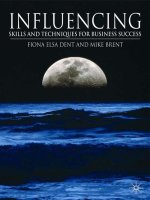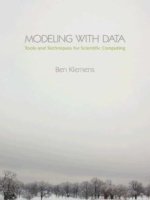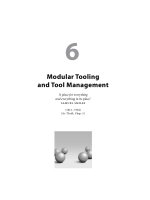tool and techniques for character interpretation
Bạn đang xem bản rút gọn của tài liệu. Xem và tải ngay bản đầy đủ của tài liệu tại đây (3.32 MB, 1,197 trang )
3/1197
4/1197
5/1197
6/1197
By Robert Blumenfeld
7/1197
THIS BOOK IS DEDICATED WITH LOVE
AND GRATITUDE TO MY MATERNAL
AND PATERNAL FAMILY: THE KORNS
AND THE BLUMENFELDS, AND
ESPECIALLY TO MY FATHER, MAX
DAVID BLUMENFELD (1911-1994), AND
8/1197
MY MOTHER, RUTH KORN
BLUMENFELD.
9/1197
Foreword by Alice Spivak I xi
Preface I xv
About This Book and How to Use It
Acknowledgments I xix
PART ONE
ACTING AND PSYCHOLOGY: CHARACTER
ANALYSIS FROM FREUD ONWARD I I
Introduction 13
10/1197
The Actor's Art and Psychology: Theoretical
and Practical Considerations
1. SIGMUND FREUD,
PSYCHOANALYSIS I 13
FATHER
OF
Prologue: The Study of Hysteria and the Beginnings of Psychoanalysis, 13;
The Foundations, I: How the Mind Works,
16;
The Foundations, II: The Stages of Psychosexual Development, the Oedipus Complex,
and the Nature of Sexuality, 23;
About Neurosis and Disturbances in Mental
Functioning, z9;
Eros and Thanatos: The Life Instinct and the
Death Instinct, 34;
Questions and Considerations: The Practical
Application of Freudian Ideas to Character
Interpretation, 35;
Free Association: An Exercise for Actors,
Writers, and Directors, 68
11/1197
2. MOTHERS OF PSYCHOANALYSIS:
ANNA FREUD, SIGMUND'S "ANTIGONE";
HELENE DEUTSCH, "FREUD'S DARLING";
KAREN HORNEY AND THE NEUROTIC
PERSONALITY I 71
Anna Freud, Sigmund's "Antigone", 71;
Helene Deutsch, "Freud's Darling": The Psychology of the Feminine and Freudian Theory, 8o;
Karen Horney on Feminine Psychology and
on Neuroses, 84
3. MELANIE KLEIN AND OBJECTRELATIONS THEORY IN GREAT BRITAIN
AND THE UNITED STATES 189
12/1197
Klein's Psychoanalytic Theories and the Beginnings of the Object-Relations School,
89;
The Development of Object-Relations Theory, Attachment Theory, and Self- Psychology 96
4. THE REBELLIOUS CROWN PRINCE:
CARL GUSTAV JUNG AND ANALYTICAL
PSYCHOLOGY I III
Prologue: The Conflict Between Jung and
Freud, 111;
The Major Concepts ofAnalytical Psychology,
114;
Questions and Considerations: The Practical
Applications of Jung's Ideas on Character
and Character Typology, 117
5.
Two
OUTSTANDING
PIONEERS:
GEORG GRODDECK AND The Book of the
13/1197
It; ALFRED ADLER AND INDIVIDUAL
PSYCHOLOGY 123
Georg Groddeck's Insights into Transference
and Ambivalence: Deepening Characterization, 123;
Alfred Adler's Ideas on Birth Order and the
Inferiority Complex,
128
6. WILHELM REICH AND CHARACTER
ANALYSIS I 135
The Emotional Plague, 137;
Character Armoring, 138;
Questions and Considerations: The Practical
Application of Reichian Ideas to Character
Interpretation, 141;
Body/ Character Armoring: An Actor's Exercise in Awareness, 149
14/1197
7. EXISTENTIAL PSYCHOLOGY: THE
THEORIES OF WILLIAM JAMES, LUDWIG
BINSWANGER, HARRY STACK SULLIVAN,
JEAN-PAUL SARTRE, AND OTHER
PIONEERS 1 151
William James on the Nature of Habits, 151;
An American School of Psychiatry: Harry
Stack Sullivan's Interpersonal Relations,
153;
Ludwig Binswanger and Existential Psychology; Viktor Frank] and Logotherapy;
Sartre and the Look in the Eye of the Other,
16o;
Facing the Opposite: An Existentialist Exercise from Gestalt Therapy, 168;
Brief Psychodynamic Psychotherapy (BPP)
and the Core Conflictual Relationship
Theme (CCRT) Method, 169;
An Exercise: Using the Core Conflictual
Relationship Theme (CCRT), 171
15/1197
8. PSYCHOLOGICAL TERMS AND TOPICS
I 175
PART TWO
INTERPRETING
CHARACTERS:
PRACTICAL
APPLICATIONS
PSYCHOLOGY 1 221
THE
OF
Introduction 1 223
PSYCHOLOGY AND PSYCHOANALYSIS IN
PLAYS AND FILMS
9.
SHAKESPEARE'S
TIMELESS
PSYCHOLOGICAL THEMES I 229
A Psychopathic Personality: Shakespeare's
Richard the Third, 229;
The Merchant of Venice: The Psychology of
Prejudice, 233;
16/1197
Some Characters in Othello: Paranoia and
Wounded Love, 24o;
A Classic Freudian Interpretation: Ernest
Jones's Hamlet and Oedipus, 244;
Other Approaches to Hamlet, 248
10. SHERIDAN, STRINDBERG,
IBSEN:
THE
DEVELOPMENT
FEMINISM I 253
AND
OF
Mrs. Malaprop and Sir Anthony Absolute in
Sheridan's The Rivals Two Narcissistic Egotists, 253;
August Strindberg's Miss Julie, 2,55;
Feminism and Ibsen's A Doll's House and
Hedda Gabler, 256
11. ANTON CHEKHOV I 265
17/1197
Chekhov's Philosophy; The Cherry Orchard,
The Seagull, and Other Plays, 265;
On the Harmfulness of Tobacco, 269;
Three Sisters, 271;
Uncle Vanya, 275
12. THE ARTISTIC TEMPERAMENT: SIX
MODERN PLAYS I 283
Introduction: The Psychology of the Artist,
283;
Martin Moran's The Tricky Part, 287;
Oscar Wilde, Lord Alfred Douglas, and The
Marquis of Queensberry in Moises
Kaufman's Gross Indecency: The Three Trials of Oscar Wilde, 289;
18/1197
Robert and Elizabeth Barrett Browning in
Rudolph Besier's The Barretts of Wimpole
Street, 297;
Emily Dickinson in William Luce's The Belle
ofAmherst, 300;
A. E. Housman in Tom Stoppard's The Invention ofLove, 302;
Rimbaud and Verlaine in
Hampton's Total Eclipse, 304
Christopher
Selected Bibliography 309
Acting and Theater, 309;
Plays and Playwrights, 310;
Psychology and Psychoanalysis, 311;
19/1197
Literary Works, Literary Biographies, and
Criticism, 317
List of Films and Television Series 1319
List of Plays 1 323
About the Author 1 327
20/1197
aving run through the gamut of plays
from every century in teaching scene study
these forty years and more, I have come up
with some rules of thumb for character analysis. I often characterize plays written since
Sophie Treadwell's Machinal as "post-Freudian" and all previous ones as "pre-Freudian." Machinal is an all but forgotten psychological drama based on a sensational real-life
murder case Treadwell had covered as a
journalist. It was produced on Broadway in
1928, with Clark Gable making his debut.
Written in a repetitive, impressionistic style,
"through the eyes" of its heroine (the
murderess), this play greatly influenced the
21/1197
young Eugene O'Neill, who went on to write
Strange Interlude using a "stream of consciousness" technique. Early O'Neill, Chekhov, Ibsen, Shaw, Wilde, Shakespeare, and
Moliere, I call preFreudian; Williams, Miller,
Inge, Pinter, Mamet, et al., post-Freudian.
My reason for making this distinction is an
important one for the actor to keep in mind
while exploring the character's psyche: Freud
brought about a universal awareness that is
present in all post-Freudian plays, in sometimes obvious and sometimes subtle ways.
Some modern playwrights, such as Arthur
Miller, "spell out" their characters' problems,
and some of the more poetic ones, Tennessee
Williams most especially, cloak their characters, keeping them in the dark. But in all
twentiethcentury post-Freudian plays, the
actor will discover in the subtext a good deal
of intrigue and complexity, conscious and
unconscious, which will eventually define his
or her performance. No one can doubt the
22/1197
Freudian influence on the New Wave English
writers, and Neil Simon's hilarious comedies
all have characters with clearly recognizable
psychological neuroses.
On the other hand, when exploring preFreudian plays, the actor must take care to
hold on to a certain innocence about his or
her character's motivations, for example with
a playwright like Chekhov, who illuminated
the human condition second only to
Shakespeare. The trials and tribulations of
Chekhovian characters derive from their
total lack of ability to understand their own
or others' motivations. It is very helpful to
the actor to analyze what motivates them,
but that analysis must recede into the unconscious in order for the actor to "become" the
character who does not understand
motivations!
A profound psychological understanding of
human nature certainly can be found in plays
as far back as the Greeks; yet any actress
23/1197
playing Antigone should not psychoanalyze
her as someone with a martyr complex. Her
reasons for choosing death have to be what
she claims them to be or the play doesn't
work. I once had a student playing Orlando
in act 3, scene 2, of As You Like It, with the
disguised Rosalind, and he was behaving
very strangely. I asked him what his choices
were, and he said that he naturally recognized that the "boy" he was with was really a
girl, and so he felt his Orlando must know it
too. Talk about the loss of innocence! Knowing but then forgetting is the actor's job in
every event. However, in pre-Freudian plays
of earlier times, it certainly helps actors to
understand fully what psychological forces
may be driving their characters, but in the
end they must remain innocent of them in
order to play the character. To do this, they
learn to accept the text at face value, first and
foremost, burying their sophisticated analyses during rehearsals. By all means analyze
24/1197
Hamlet's procrastination, but be sure at the
same time to keep him in his Shakespearean
state of self-woe and determination for
revenge!
With this book, Robert Blumenfeld has
done all the research into the modern science of psychology for us, which, combined
with his personal experience as an actor and
a coach in the theater, fills a void and goes a
very long way in correcting the controversy
and confusion regarding the use of Freud in
both the acting classroom and play rehearsals. This book, written in a lively and readable style, helps us analyze what lies behind
our own behavior and how it can be used as a
source for the character in the play.
As an acting teacher and coach, I have acquired a particular aversion to the unfortunately all too common teaching approach
that had its beginnings way back in the
1950S inside the Actors Studio. Grossly misinterpreting the original Stanislavsky tenets,
25/1197
the instructor in these types of classes uses
pseudopsychoanalytic methods as a means of
"opening up" acting students and "breaking
down" their inhibitions. The students are often forced to "expose" themselves in front of
the class in the form of "private moment" exercises and, in some cases, even appear
nude! My own philosophy of teaching acting
emphasizes instead a respect for my students' personal lives, treating them as "colleagues" and not as "patients."
There is no doubt that searching into one's
past in order to understand how childhood
events have molded one's adult behavior is a
very useful step in analyzing a character in a
play. Such self-analysis helps to provide substitutions, where necessary, to bring about
the behavior and emotions required.
However, these personal revelations should
be kept private. They are not to be shared
with the class as a whole. The danger in making public in class intimate details of the









